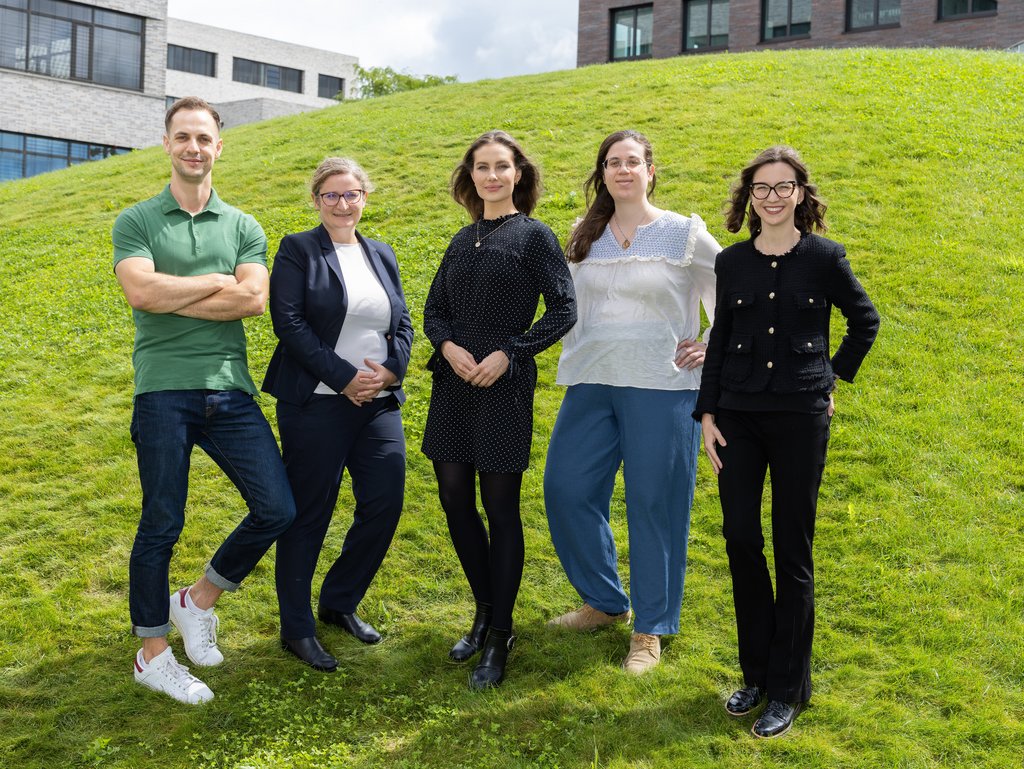
TUM Campus Heilbronn

Welcome to the Professorship for Entrepreneurship and Family Enterprise,
I am professor for Entrepreneurship and Family Enterprise and Director at the Global Center for Family Enterprise at the TUM School of Management. My team and myself conduct research at the intersection of entrepreneurship and family business. In particular, we are interested in investigating topics such as female entrepreneurship, new venture team design, strategic ownership and the role of digital technologies in family enterprises. Further, we are interested in understanding better the social context, in which entrepreneurs and family enterprises are embedded in.
Since June 2020
Director Global Center for Family Enterprise (GCFE) at TUM School of Management, TUM Campus Heilbronn
Since June 2020
Professor of Entrepreneurship and Family Enterprise at TUM School of Management, TUM Campus Heilbronn
01/2018 – 05/2020
Operative Director at the Global Center for Entrepreneurship and Innovation, University of St. Gallen
01/2018-01/2020
Visiting Scholar at the Center for Family Entrepreneurship and Ownership, Jönköping University
01/2015 – 05/2020
Assistant Professor of Management, University of St. Gallen
2010 – 2014
PhD studies in Business Administration, Stockholm School of Economics
05/2013
Visiting Researcher at the Centre for Entrepreneurship and Family Enterprise, University of Alberta
2012 – 2013
Visiting Researcher at McGill University and HEC Montréal
Management and entrepreneurship research reports a growing number of female-owned and -led ventures worldwide, which significantly contribute to countries’ economic growth and wealth. Given the economic relevance of female entrepreneurs, our research aims to provide relevant and new insights into gender-related issues and complex relationships related to entrepreneurship and family enterprises. Although females’ economic participation has increased significantly in the recent years, serious gender inequalities persist, calling for a better understanding of the drivers of and barriers to female entrepreneurship.
In this regard, we are particularly interested in understanding gender-specific characteristics of female entrepreneurs and their implications for entrepreneurship and the strategic management of family enterprises. In our current research projects, we are interested in understanding the antecedents that support or hinder female entrepreneurs to enter and exit their ventures and how individual and firm-level characteristics influence the success of female-led ventures.
Research has found that entrepreneurial endeavors involve collective action, thereby recognizing that the new venture team occupies a towering position in shaping the venture’s strategy and hence new venture success. Previous research has shown that the composition of new venture teams with regard to demographic characteristics plays an important role in team formation and in shaping the firm’s success. Yet, extant research does not provide a comprehensive view on how new venture teams should be designed to achieve firm growth and survival. We aim to fill this research gap by studying the impact of key elements of new venture team design on nascent firm growth, strategic decision-making and survival. The study of new venture team design needs to move beyond static perspectives of founding team composition by addressing elements of power distributions within new venture teams, the role of employees in complementing the entrepreneurial team and team dynamics such as entrepreneurial team turnover events. This research project is supported by the Swiss National Science Foundation and was evaluated as outstanding research project.
Research at the intersection between entrepreneurship and psychology especially focused on the entrepreneurs’ cognitions to explore their idiosyncratic decision-making. Cognitions are defined as “the knowledge structures that individuals use to make assessments, judgments or decisions involving opportunity evaluation and venture creation and growth”. As a theoretical framework, we employ behavioral decision theory and employ cognitive biases to study how entrepreneurs’ decision-making influences new ventures’ survival and firm growth. Within this project, we try to answer following question: How do entrepreneurs’ cognitive biases lead to inefficient decisions and behavior that translate into firm level outcomes?
Further, we are particularly interested in understanding the strategic role of owners within private firms and their implications for firm success. In particular, we are interested in understanding how ownership governance can be strategically employed to achieve competitive advantage and effective resource deployment within private enterprises. Within one research project, we are interested in understanding how and under what conditions firm owners’ competence affects firm growth.
In another research project, we are interesting in understanding how firm owners and their goals influence the integration of non-economic goals such as decarbonisation efforts within firms (this project is supported by the Dr. Hans Riegel-Stiftung).
The corona crisis has triggered an increase in remote work for the majority of employees around the world. Research on family businesses has remained silent on how this new type of employment relationship influences the supervisor-employee collaboration. In this context, we research at the intersection of family firms and digital technologies. In particular, we aim to unveil the mechanisms through which these technologies are changing the way family businesses organize and coordinate their job tasks and how digital technologies influence the supervisor-employee relationship. To get a kaleidoscopic view of the phenomenon, we have designed a multiple case study that investigates small and medium-sized family businesses. The goal is better understand how digital technologies may be used to facilitate the supervisor-employee relationship.
Another research project in this vein investigates how digital technologies as a transformative driver affect the coordination of entrepreneurial teams. Specifically, we aim at understanding how digital technologies influence team performance.
Scientific staff
Scientific staff
Visiting Professor





Professor for Educational Leadership and Excellence at Stockholm School of Economics, Sweden





This module introduces students into basic principles of the topic of entrepreneurship from a global and international perspective. Students will be equipped with basic knowledge on:
Family enterprises are owned and/or managed by families, which face unique challenges to achieve growth and long-term sustainability. In doing so, innovation represents a critical antecedent to firm survival. Family enterprises often have long traditions and introducing innovation is often associated with tensions. This course addresses various aspects of such innovation management processes in family enterprises- Particular attention is paid to how family enterprises innovate, types of innovation that family firms integrate as well as which benefits innovation brings to them. An examination on digitalization of family firms as a way to implement innovation is also discussed in this course.
The lecture “Entrepreneurship” provides students with knowledge of the theoretical concepts and models of entrepreneurship. Students will acquire in-depth theoretical knowledge on:
Established companies are under unyielding pressure to remain entrepreneurial and discover new ways to grow. But how is it possible to enhance entrepreneurship of established companies in a sustainable way? Corporate entrepreneurship has been framed as important concept for firms to remain competitive and a powerful tool for managers, employees and firm advisors.
Traditionally, the main focus of corporate entrepreneurship (CE) has been about the founding of new business within established companies, such as new product or business units, stand-alone offices in new geographical areas, spinoffs, joint ventures or corporate ventures. However, CE is actually much more. Entrepreneurship is required whenever a firm or individual ventures into any unfamiliar (“far from core”) area in which success is significantly uncertain. The need for corporate entrepreneurship is clear; however, how firms should implement CE is not well understood and managed and often results in resistance. This course addresses challenges of making an established company entrepreneurial – in particular, it will also investigate how established firms can deal with the challenge of remaining entrepreneurial. During the seminar, we will create a profound and vivid discussion on key topics around CE based on established literature and practical examples.
This course deals with the management of family firms. Given that the majority of firms around the world are family businesses (ranging between 75-90 %), it is crucial to understand better the particularities of family businesses. Given that the boundaries between the family and the business overlap, certain challenges may arise that makes family businesses unique. The objective of this course is to better understand the challenges and opportunities family firms face and how managers, owners, and advisers can best deal with them. By combining various theoretical frameworks with hands-on examples, we will elaborate on how to manage family enterprises successfully.
This course contributes to complementing the Corporate Campus Challenge organized by the Campus Founders at the Bildungscampus in Heilbronn. The Corporate Campus Challenge gives students the opportunity to take actual entrepreneurial actions by applying methods from Design Thinking and Lean Startup to a given challenge posed by a corporation. “Challenges” (i.e. real world problems faced by corporations) are provided by corporate partners and teams are guided on their experimental journey by coaches of the Campus Founders as well as lecturers of the TUM. They will work in diverse groups consisting of young professionals and students from different professions and universities. The challenge includes developing a functional prototype, delivering an inspiring final pitch, and creating a valuable documentation for the corporate partners. 14 weeks hands-on mentality to experience the full entrepreneurial journey are complemented by our course offering profound and vivid discussions on key topics based on established literature as well as reflection to reinforce key learnings.
We offer exciting project studies with companies in the region for master students. Please contact us in case you are interested in doing a project study with us.
This course will support you in developing, and evaluating business ideas for creating technology-based ventures. The course will introduce you to product innovation and product development methods that will help you to turn your business idea into a viable venture. We will also cover concepts related to an entrepreneurial mindset, design thinking, lean start-up approach, SCRUM, Stage-gate model and business model canvas.
This course addresses various aspects of sustainability available to new ventures and established family enterprises. Sustainable entrepreneurship (SE) emphasizes that entrepreneurs may pursue additional goals such as social and ecological goals that may alleviate social and ecological problems. It explores the opportunities that entrepreneurs create, the challenges entrepreneurs encounter, and the ways in which entrepreneurs exploit opportunities to contribute toward enhancing the society while simultaneously starting and sustaining a profit-oriented business. This course also examines the role of sustainability in family enterprises.
Being an entrepreneur involves making essential decisions, giving advice to other team members, and assess the decisions of other important stakeholders. However, in rapidly changing business environments with high uncertainty and information asymmetries, entrepreneurs have to make decisions under time pressure. When taking decisions, entrepreneurs often rely on habitual problem-solving techniques and intuition. In consequence, they can be exposed to unconscious biases that may not result in the best available decision. Familial relationships can represent an antecedent of the entrepreneurs’ biases. Therefore, biases are also highly prevalent in family enterprises. This course will help you to become aware of such cognitive biases and introduce you to frameworks that may improve your decision-making.
We offer exciting project studies with companies in the region for master students. Please contact us in case you are interested in doing a project study with us.





The professorship of entrepreneurship and family enterprise has formed partnerships with diverse companies and organizations which contribute to the teaching and research activities.
von Nitzsch, J., Bird, M. & Saiedi, E. (forthcoming). The strategic role of owners in firm growth: Contextualizing ownership competence in private firms. Strategic Entrepreneurship Journal.
Querbach, S., Bird, M., Kraft, P.S. & Kammerlander, N. (2020). When the former CEO stays on board: The role of the predecessor’s board retention for product innovation in family firms. Journal of Product Innovation Management 37(2), 184-207.
Bird, M. & Zellweger, T. (2018). Relational embeddedness and firm growth: Comparing spousal and sibling entrepreneurs. Organization Science 29(2), 264-283.
Bird, M. & Wennberg, K. (2016). Why family matters: The impact of family resources on immigrant entrepreneurs’ exit from entrepreneurship. Journal of Business Venturing 31(6), 687-704.
Kammerlander, N., Dessi, C., Bird, M. & Floris, M. (2015). The impact of shared stories on family firm innovation: A Multicase Study. Family Business Review 28(4), 332-354.
Bird, M. & Wennberg, K. (2014). Regional influences on the prevalence of family versus non-family start-ups. Journal of Business Venturing 29(3), 421-436.
Wiklund, J., Nordqvist, M. & Hellerstedt, K., Bird, M. (2013). Internal versus external ownership transition in family firms: An embeddedness perspective. Entrepreneurship Theory and Practice 37(6), 1319-1340.

Postal address:
Bildungscampus 9
74076 Heilbronn